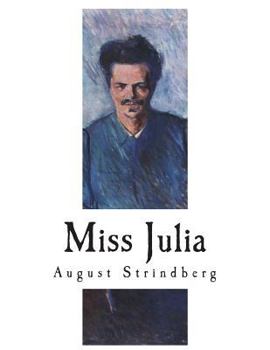Miss Julia: A Naturalistic Tragedy
Select Format
Select Condition 
Book Overview
In Miss Julie, a willful young aristocrat, whose perverse nature has already driven her fianc to break off their engagement, pursues and effectively seduces her father's valet during the course of a... This description may be from another edition of this product.
Format:Paperback
Language:English
ISBN:1721962522
ISBN13:9781721962525
Release Date:June 2018
Publisher:Createspace Independent Publishing Platform
Length:50 Pages
Weight:0.31 lbs.
Dimensions:0.1" x 8.5" x 11.0"
Customer Reviews
5 ratings
"When gentry try to act common they become common."
Published by Thriftbooks.com User , 17 years ago
While keeping faith with August Strindberg's original intent, French's take on this classic repartee emphasizes the arguments used by the main characters in a subtle twisting of gender vs. class. There are three main characters: Miss Julie, daughter of a count; Jean, the count's manservant; and Kristin, the cook, who provides a dispassionate social commentary to the exchanges between Miss Julie and Jean, her rigid morality and sense of place indisputable. From the start, Miss Julie, although from a superior class to the servants, is described by them as "emotionally unstable", her actions on Midsummer's Eve "inappropriate". Although she enjoys the distinction of her position, Miss Julie's power is tempered by the fact that she is female and given to behavior that simply is not perceived the same way as a male in a patriarchal society. In that sense, Miss Julie is destined to be the loser in any confrontation, regardless of the fact that Jean, her seducer, is a servant. In a class-based world, the servants live strictly proscribed lives, their own hierarchy governed by acceptable and unacceptable mores. Jean is acutely aware of this state of affairs; although he is the culprit, giving into his male nature and taking advantage of Miss Julie's confusion and inexperience, it is she who suffers, she who is akin to a baby bird fallen from the nest with no instinct for survival. Running the gamut of emotions, from desire to jealousy to dominance, Jean's behavior is all the more shocking for his blasé manipulation of the situation. Having had his satisfaction, he toys with his victim before falling back into the more comfortable role of manservant. It is Miss Julie who will be harshly judged by society, including the servant class who observes her activities with relish. This shocking social commentary exposes the fallacies of class and gender, acted out between two people who can bridge neither, their very humanity rendered irrelevant. Luan Gaines/2006.
Julia Gulia
Published by Thriftbooks.com User , 17 years ago
This play was pretty entertaining all the way through. There's a bit of anti-woman propaganda in there, but everyone knows August Strindberg wasn't a big fan of women. Looking past that, the dialogue is great and the story is pretty interesting. These characters are actually three-dimensional and have a depth of feelings that would be great to see on stage. A good actor could really create an awesome piece with this play. Definitely recommend it as a quick read and there's a few monologues in there. A 20-25 year old woman could do a Miss Julie monologue, and a 25-35 year old man could do a Jean monologue. Check it out.
Spiral
Published by Thriftbooks.com User , 20 years ago
Strindberg's classic play follows the downward spiral of an aristocratic young woman whose break-up with her fiancé is quite the talk of the estate. Miss Julie pursues her father's valet, and seduces him, without thought for the repercussions. Unfortunately for Julie, these consequences must be faced. Controversial at its debut, "Miss Julie" also was highly original in form and structure, and while its subject matter isn't as shocking today, the palpable drama does resonate.
Mistress and servant
Published by Thriftbooks.com User , 21 years ago
"Miss Julie," by August Strindberg, is a play with three speaking parts: Miss Julie, a nobleman's daughter; Jean, a young valet; and Christine, a cook in the household. The Dover Thrift Edition version is translated by Edwin Bjorkman. A brief introductory note states that the play first appeared as a printed text in 1888, a year before its first staging.The play's title character is bold and flirtatious; her behavior, unsurprisingly, leads to controversy. "Miss Julie" is a fascinating glimpse at a society that is rigidly ordered around class stratification, gender roles, and sexual conduct; the play looks at the consequences when people resist this rigid order. The play has some really startling, thought-provoking dialogue.Recommended companion texts: "Hands Around," by Arthur Schnitzler; "Daisy Miler," by Henry James; and "Cuckoos," by Giuseppe Manfridi. Each of these three literary works shares at least one significant theme or motif in common with "Miss Julie."
Miss Julie
Published by Thriftbooks.com User , 24 years ago
Definitely one of the better plays I have read in my survey of late 19th century European drama. While there are slight flaws in it, such as frequent mood swings by the characters, the overall writing is fabulous. Jean is a perfectly portrayed Machiavelli, doing what is necessary for him to succeed at whatever costs. Julie, on the other hand, wavers between the strong and self-confident seductress of the beginning, to the weak and manipulated wronged woman at the end. Definitely a cornerstone in the history of modern drama.





